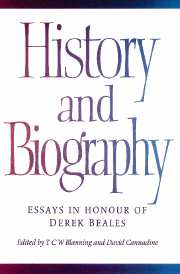Book contents
- Frontmatter
- Contents
- Notes on contributors
- Introduction: Derek Beales as historian and biographer
- 1 Baron Bartenstein on Count Haugwitz's ‘new System’ of government
- 2 The rise of the first minister in eighteenth-century Europe
- 3 An old but new biography of Leopold II
- 4 John Marsh's History of My Private Life 1752–1828
- 5 The gallows and Mr Peel
- 6 Széchenyi and Austria
- 7 Past and future in the later career of Lord John Russell
- 8 Documentary falsification and Italian biography
- 9 Kaiser Wilhelm II and the British monarchy
- 10 The historical Keynes and the history of Keynesianism
- 11 Bastianini and the weakening of the Fascist will to fight the Second World War
- 12 The New Deal without FDR: what biographies of Roosevelt cannot tell us
- History and biography: an inaugural lecture
- Derek Beales: a chronological list of publications
- Index
10 - The historical Keynes and the history of Keynesianism
Published online by Cambridge University Press: 10 December 2009
- Frontmatter
- Contents
- Notes on contributors
- Introduction: Derek Beales as historian and biographer
- 1 Baron Bartenstein on Count Haugwitz's ‘new System’ of government
- 2 The rise of the first minister in eighteenth-century Europe
- 3 An old but new biography of Leopold II
- 4 John Marsh's History of My Private Life 1752–1828
- 5 The gallows and Mr Peel
- 6 Széchenyi and Austria
- 7 Past and future in the later career of Lord John Russell
- 8 Documentary falsification and Italian biography
- 9 Kaiser Wilhelm II and the British monarchy
- 10 The historical Keynes and the history of Keynesianism
- 11 Bastianini and the weakening of the Fascist will to fight the Second World War
- 12 The New Deal without FDR: what biographies of Roosevelt cannot tell us
- History and biography: an inaugural lecture
- Derek Beales: a chronological list of publications
- Index
Summary
John Maynard Keynes lent his name to the most influential paradigm in the political economy of the mid-twentieth century. During the last thirty years a distinction – though not always the same distinction – has increasingly been drawn between Keynes and Keynesianism. To study Keynes himself points towards problems which are essentially biographical, just as the impact of Keynesianism indicates problems which are more broadly historical; one approach enters into disputes about intentions, while the other is more concerned with assessing outcomes; and the two projects need to be linked. Major biographies by Donald Moggridge and Robert Skidelsky have now modified important features of Sir Roy Harrod's great monument to his friend, and thereby helped to retrieve the historical Keynes: a child born in the year that Marx died, a Victorian in his eighteenth year at the end of the old queen's reign, a man of only sixty-two at his death in 1946. Recently Keynes's early beliefs of which he gave a famous account, and his work on probability, have become the focus of lively debate among historians, philosophers and economists. All of this is relevant to understanding Keynes's own conception of political economy.
The historical fate of Keynesianism is likewise now seen in a new perspective. In the period up to the 1960s, naive Keynesian triumphalism postulated a conversion to Keynes's ideas which was at once inevitable, beneficent, and permanent; since then, vulgar anti-Keynesianism has been premised on Keynes's alleged deficiencies in analysis, foresight and practical wisdom.
- Type
- Chapter
- Information
- History and BiographyEssays in Honour of Derek Beales, pp. 203 - 226Publisher: Cambridge University PressPrint publication year: 1996

